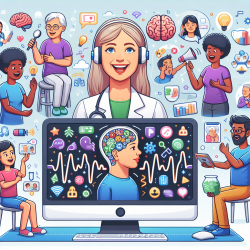As speech-language pathologists (SLPs), our mission is to improve communication outcomes for children. To achieve this, staying informed about the latest research is essential. One such groundbreaking study, "Deficiency of ECHS1 causes mitochondrial encephalopathy with cardiac involvement," offers valuable insights that can enhance our practice.The study, published in the *Annals of Clinical and Translational Neurology*, explores the broad phenotypic spectrum and pathobiochemistry of individuals with autosomal-recessive ECHS1 deficiency. ECHS1 is a mitochondrial matrix enzyme crucial for the oxidation of fatty acids and essential amino acids like valine. The deficiency in this enzyme leads to a variety of symptoms, including encephalopathy, deafness, epilepsy, optic atrophy, and cardiomyopathy.Here’s how you can leverage the findings from this research to improve your practice:
Understanding the Implications of ECHS1 Deficiency
ECHS1 deficiency affects multiple systems in the body, leading to complex clinical presentations. The study highlights the following key points:
- Neurological Impact: The most prominent clinical features include encephalopathy, epilepsy, and optic atrophy. These conditions can significantly affect a child's communication abilities.
- Sensorineural Deafness: Almost all patients in the study exhibited sensorineural deafness, emphasizing the need for early hearing assessments and interventions.
- Cardiomyopathy: Although less common, cardiomyopathy was observed in some patients, indicating the importance of a multidisciplinary approach to treatment.
Data-Driven Strategies for SLPs
Given the complex nature of ECHS1 deficiency, SLPs can adopt several data-driven strategies to enhance therapeutic outcomes:
- Early Identification and Intervention: Early diagnosis is crucial for managing the symptoms effectively. Regular hearing assessments and neurological evaluations should be part of the routine check-ups for children at risk.
- Multidisciplinary Collaboration: Work closely with pediatricians, neurologists, and cardiologists to develop a comprehensive treatment plan. Collaborative care ensures that all aspects of the child's health are addressed.
- Customized Therapy Plans: Tailor speech and language therapy plans based on the individual needs of each child. For instance, children with sensorineural deafness may benefit from alternative communication methods such as sign language or AAC (Augmentative and Alternative Communication) devices.
- Parental Involvement: Educate and involve parents in the therapeutic process. Provide them with resources and training to support their child's communication development at home.
Encouraging Further Research
While this study provides a solid foundation, further research is essential to fully understand the implications of ECHS1 deficiency on child development. SLPs can contribute to this body of knowledge by:
- Participating in Research Studies: Collaborate with research institutions to participate in studies related to mitochondrial disorders and their impact on communication.
- Documenting Clinical Observations: Keep detailed records of your clinical observations and outcomes. Sharing this data with the broader scientific community can help identify patterns and inform future research.
- Staying Informed: Regularly review the latest research and updates in the field. This continuous learning will enable you to provide the best possible care to your patients.
In conclusion, the study on ECHS1 deficiency offers valuable insights that can significantly impact our practice as speech-language pathologists. By understanding the neurological, auditory, and cardiac implications of this condition, we can develop more effective, data-driven therapeutic strategies.To read the original research paper, please follow this link:
Deficiency of ECHS1 causes mitochondrial encephalopathy with cardiac involvement.










